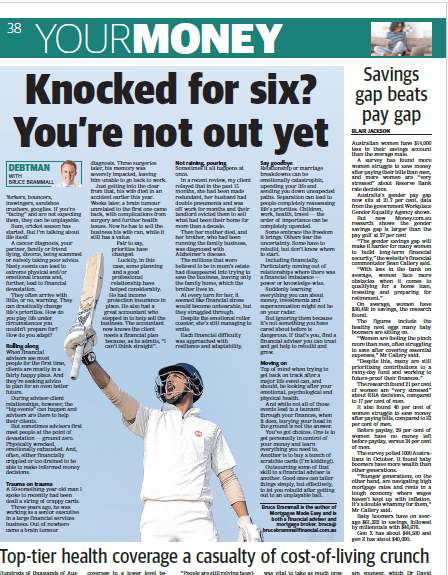
Bruce Brammall, The West Australian, 21 October 2024
Yorkers, bouncers, inswingers, sandshoe crushers, googlies. If you’re “facing” and wasn’t expecting them, they can be unplayable.
Sure, cricket season has started. But I’m talking about life itself.
A cancer diagnosis, your partner, family or friend dying, divorce, being scammed or naively taking poor advice. Nasty events can lead to extreme physical and/or emotional trauma and, further, lead to financial devastation.
They often arrive with little, or no, warning. They can drastically change life’s priorities. How do you play life under circumstances you couldn’t prepare for? How do you adapt?
Rolling along
When financial advisers see most people for the first time, clients are mostly in a fairly happy place. And they’re seeking advice to plan for an even better future.
During adviser-client relationships, however, the “big events” can happen and advisers are there to help their clients.
But sometimes advisers first meet people at the point of devastation – ground zero. Physically wrecked, emotionally exhausted. And, often, either financially crippled or too drained to be able to make informed money decisions.
Trauma on trauma
A 50-something-year-old man I spoke to recently had been dealt a string of crappy cards.
Three years ago, he was working as a senior executive in a large financial services business. Out of nowhere came a brain tumour diagnosis. Three surgeries later, his memory was severely impacted, making him unable to go back to work.
Just getting into the clear from that, his wife died in an accident earlier this year. Weeks later, a brain tumour unrelated to the first one came back, with complications from surgery and further health issues.
Now he has to sell the business his wife ran, while it still has a value.
Fair to say, priorities have changed.
Luckily, in this case, some planning and a good professional relationship have helped considerably. He had income protection insurance in place. He also had a great accountant who stepped in to help sell the business. The accountant now knows the client needs a financial plan because, as they admit, “I can’t think straight”.
Not raining, pouring
Sometimes it all happens at once.
In a recent review, my client relayed that in the last 15 months, she had been made redundant, her husband had double pneumonia and was off work for months and their landlord evicted them to sell what had been their home for more than a decade.
Then her mother died, and her brother, who had been running the family business, was diagnosed with Alzheimer’s Disease. The millions that were believed to be in mum’s estate had disappeared into trying to save the business, leaving only the family home, which the brother lives in.
At every turn for her, it seemed like financial stress would become unbearable, but they struggled through.
Despite the emotional rollercoaster, she’s still managing to smile. Each financial difficulty was approached with resilience and adaptability.
Say goodbye
Relationship or marriage breakdowns can be emotionally catastrophic, upending your life and sending you down unexpected paths.
Separation can lead to people completely reassessing life priorities. Children, work, health, travel – the order of importance can be completely upended.
Some embrace the freedom it brings. Others fear the uncertainty. Some have to rebuild, but don’t know where to start.
Including financially. Particularly coming out of relationships where there was a financial imbalance – power or knowledge wise.
Suddenly learning everything you can about money, investments and superannuation might not be on your radar.
But ignoring them because it’s not something you have cared about before is dangerous. If that’s you, find a financial adviser you can trust and get help to rebuild and grow.
Moving on
Top of mind when trying to get back on track after a major life event can, and should be, looking after your emotional, psychological and physical health.
And while not all of those events lead to a tsunami through your finances, when it does, burying your head in the ground is not the answer.
You’ve got choices. One is to get personally in control of your money and learn everything you need to. Another is to buy a whole bunch of scratchie cards (I’m kidding!).
Outsourcing some of that skill to a financial adviser is another. Good ones can tailor things simply, but effectively, to let you rebuild after getting out to an unplayable ball.
Bruce Brammall is the author of Mortgages Made Easy and is both a financial adviser and mortgage broker. E: bruce@brucebrammallfinancial.com.au.